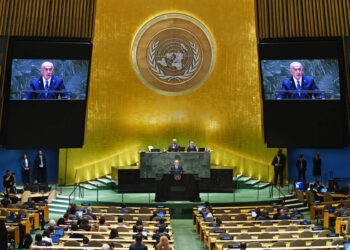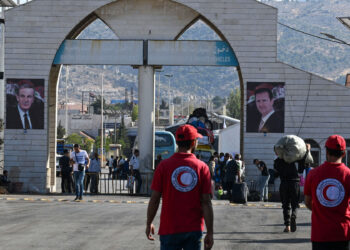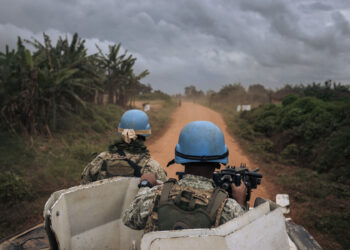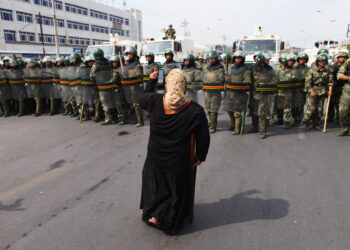*Ahmad Algohbary is a freelance Yemeni journalist who has reported on the Yemen war for international media since war broke out in 2015. His work has appeared in The Guardian and Al Jazeera English, among other outlets. As Co-Director of Photography, Aloghbary filmed the 2018 documentary “Yemen Skies of Terror,” which was nominated for Emmy and Sheffield Awards, and won an online journalism award. Algohbary has also launched a public funding campaign via his Twitter account to provide support for child victims of the war. He tweets at @AhmadAlgohbary.
The prospect of peace talks elicits doubt and suspicion from many Yemenis today, following the failure of several attempts by the United Nations to bring the warring parties together for negotiations to end the nearly nine-year conflict. With each attempt, world powers, including those providing military support for Saudi Arabia's war effort against Houthi rebels, have publicly expressed their support for talks. The rhetoric from the United States, the United Kingdom and other Western countries has been so high that some Yemenis have felt the war might actually be coming to an end. Each time, it wasn't. Last year's U.N.-brokered truce, signed in April and twice extended until October, signaled a rare yet small reprieve. With the cease-fire, Yemen's front lines mostly went quiet and the Saudi-led coalition halted its air strikes while offering some relief from its economic blockade.
Yet after witnessing so much destruction to their country and enduring the devastating consequences, including some of highest rates of malnutrition in the world, Yemenis still have yet to see much for themselves from a fledgling peace process. The truce meant little to their daily lives, given the scale of their economic suffering and Yemen's humanitarian crisis. A common complaint among Yemenis is that the warring parties, along with the U.N. itself, have not prioritized their urgent needs as they engage in ongoing diplomacy to bring about a resolution to the conflict.
"Priorities of the people must have been impossible to figure out in their minds," said Sabir al-Faqih, a grocery owner in Sana'a, referring to both the warring parties and U.N.-led peace efforts. "Each one has their own interests to think about." He said that promises to address the suffering of the Yemeni people ring hollow. "Nothing has materialized."
"The blockade should be lifted unconditionally, because it is the main driver of the humanitarian crisis in Yemen."
- Aisha Jumaan, president of the Yemen Relief and Reconstruction Foundation
The expired truce called for a halt of air and ground attacks by all parties, and two measures to ease the Saudi-led blockade of Yemen's ports: the entry of 18 fuel ships into the Houthi-control port of Hodeidah over two months, and two commercial flights a week from Sana'a International Airport to Amman and Cairo. The truce also included a commitment to talks to open roads into Taiz, which has been besieged by the Houthis for years. After the truce was signed, long queues of cars at fuel stations—a familiar sight in Sana'a and across Yemen for years—disappeared, although the price of fuel remained and is still high for most of the population. Thousands of people in need of urgent medical treatment abroad could finally fly out of Sana'a's airport.
Yet the truce provided few other breakthroughs in the hardships faced by most Yemenis. Already high food prices keep rising, in part because of the war in Ukraine and sharp decline in its wheat exports. Even those Yemenis who still earn a living are struggling to afford the basic food items.
Despite formally ending last October, the truce has still largely held since then. Observers of Yemen have praised the relative pause in the war, yet they stress the need to help ordinary Yemenis. Aisha Jumaan, the president of the Yemen Relief and Reconstruction Foundation, said that, despite its success in de-escalation, the truce has meant little for the majority of Yemenis. "This has not had a major impact on easing the economic devastation and reducing hunger or preventing deaths from communicable and non-communicable diseases," said Jumaan. "Salaries have not been paid to public servants since 2016, and the blockade on essential goods, including medicine, is still in place."
The suspension of public sector salaries for all that time has meant that more than a million civil servants have not been paid. They are the breadwinners of an estimated ten million more Yemenis.
"The United Nations played a positive role in reducing human suffering in Yemen, but it was unable to stop the sharp deterioration in the humanitarian file," said Rashid al-Haddad, a Yemeni economist. "The United Nations could not fully play its role in the humanitarian field, as it avoided clashing with the parties to the conflict." The truce, he added, "did not reflect positively on the lives of Yemenis due to the non-implementation of all its provisions. The military conflict stopped, but the continuation of the siege greatly increased the suffering of Yemenis."
The payment of salaries for public servants and lifting of the blockade were supposed to be priorities for negotiators during the truce. As the U.N. special envoy to Yemen, Hans Grundberg, told U.N. Security Council in November, "addressing urgent humanitarian and economic issues is needed in the immediate term to avoid the situation for civilians to deteriorate further." But he admitted there is a long timetable dependent on much bigger peace talks. "More durable solutions can only be reached in the context of a comprehensive settlement of the conflict," he said. "Many of the economic issues being discussed, such as the issue of revenue management for the payment of salaries, require cooperation between the parties in order to be sustainable."
Until this stalemate is resolved, Yemenis will needlessly suffer—"held hostage to negotiations where warring parties want to score points against each other."
- Ahmad Algohbary
It was a frustrating and familiar message to many Yemenis, who blame the warring parties for ignoring their plight. "They could have made concessions to ensure the most urgent needs of the Yemeni people are met, including paying the salaries and lifting the blockade that is strangling the economy," said Jumaan. "The blockade is the silent killer in Yemen. The majority of people suffering from food insecurity are dying in their homes."
Facing public outrage over these delays, each party to the conflict has blamed the other for being responsible. The Saudi-led coalition and the U.N.-recognized Yemeni government in Aden, which it backs, have said that they have agreed to a U.N. proposal to pay the public servant salaries—but that they cannot agree to the request by the rival, Houthi-led government in Sana'a to include payment for the defense and security forces allied to them. The Houthis have stressed that those sectors constitute the bulk of the people employed by the government and that they come from all parts of Yemen, not just areas under their control.
Until this stalemate is resolved, Yemenis will needlessly suffer—"held hostage to peace negotiations where warring parties want to score points against each other," as Jumaan put it. She called for more humanitarian steps to be taken regardless of any progress made by the U.N. to renew the truce and start more formal peace talks. "The blockade should be lifted unconditionally, because it is the main driver of the humanitarian crisis in Yemen," she said.
But Sabir al-Faqih, the grocer in Sana'a, has lost hope. "It's hard to imagine now that the people's urgent needs will ever be met."







